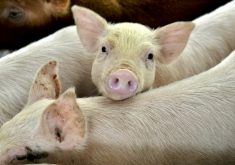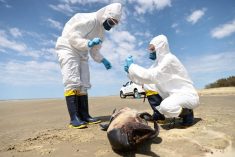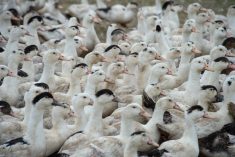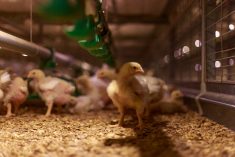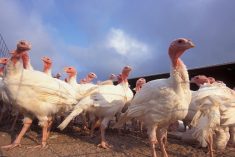The quarantine has been lifted at the last of the 13 farms in British Columbia’s Fraser Valley known to have been infected with highly-pathogenic avian flu.
The farm, a 53,000-bird table egg layer operation at Langley, B.C., was confirmed Dec. 13 with high-path H5N2 avian flu.
At the end of a 21-day waiting period following depopulation of birds, cleaning and disinfection at the infected premises, the farm’s quarantine was lifted Wednesday, the Canadian Food Inspection Agency (CFIA) reported.
Surveillance testing of domestic poultry is to continue throughout the province for the 90 days after the completion of cleaning and disinfection on all infected premises.
Read Also

U.S. not ready to lift Mexican cattle ban over screwworm, Agriculture Secretary Rollins says
The U.S. is not yet ready to reopen its border to Mexican cattle amid an outbreak of the flesh-eating New World screwworm parasite, Agriculture Secretary Brooke Rollins said, but she is pleased with Mexico’s efforts to contain the pest.
Such a surveillance period, CFIA said previously, is required under standards set up by the World Organization for Animal Health (OIE) to be met by countries seeking to establish — or re-establish — their status as avian influenza-free.
In the case of the Fraser Valley outbreaks, the CFIA had reported March 11 that cleaning and disinfection had been completed at all 13 infected properties — which would put the end of the 90-day surveillance period at June 7.
A CFIA spokesperson wasn’t immediately able to confirm an end date Thursday.
The affected farms also included 11 commercial turkey and broiler breeder operations, all of which were confirmed with H5N2 between Dec. 1 and 17. A pair of “non-commercial” farms were confirmed Dec. 19 at Aldergrove and Feb. 2 near Chilliwack with high-path H5N2 and H5N1 respectively.
“Known flyway”
The end of the 13 quarantines does not mean no risk remains for avian flu in the province, CFIA said.
“A definitive source of this outbreak has not been confirmed, but wild migratory birds are a known reservoir of the avian influenza virus,” the agency said. “There is a significant resident wild bird population in the Fraser Valley and it is a known flyway for migrating birds.”
To prevent further spread of avian flu in Canada, CFIA has already blocked imports of live birds, uncooked poultry products and eggs from the Pacific flyway states of California, Idaho, Oregon and Washington, where other outbreaks were confirmed around the same time in wild birds, backyard poultry and/or commercial flocks.
Canada is also blocking such imports from the Mississippi flyway states of Kansas, Arkansas, Missouri and Minnesota, where outbreaks of the similar strain of H5N2 have been confirmed more recently in commercial birds.
Canada’s poultry and egg producers must also “continue to implement good biosecurity practices to prevent the introduction of the disease into individual flocks,” the agency said.
CFIA has previously said meeting the OIE standards for disinfection and surveillance will be “an important step toward the removal of trade restrictions” imposed by other countries on poultry products from B.C. and/or Canada.
Canada “will work with its trading partners to return to normal trading requirements as quickly as possible,” CFIA said.
Countries including the U.S., South Korea, Hong Kong, South Africa, Mexico, Taiwan and Japan have had varying degrees of bans on B.C. or Canadian products since the Fraser Valley outbreaks. — AGCanada.com Network



